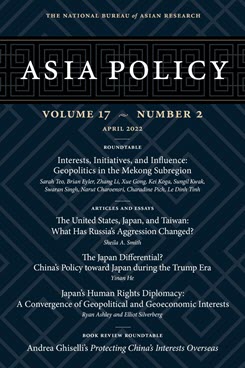The Japan Differential? China’s Policy toward Japan during the Trump Era
This article seeks to explain China’s seemingly preferential treatment of Japan during the Trump administration in the U.S.—in comparison to its harsh, “wolf warrior” style of diplomacy toward other countries that challenged its core interests—by examining the perspective of the Chinese government and policy elites with regard to Japan.
EXECUTIVE SUMMARY
MAIN ARGUMENT
In recent years, Japan has been spared China’s diplomatic intimidation to a large degree because of its uniquely advantageous bargaining position vis-à-vis China, derived from its economic and technological strength as well as its crucial role in an emerging security network in the Indo-Pacific. Japan’s importance to China’s regional ambitions was only magnified during the Trump administration when China battled the headwinds of both domestic and international challenges. But China’s softer attitude to Japan proved more of a short-term gesture than a genuine change of heart toward the country, and most Chinese elites have felt little need for China to make substantial compromises to address Japan’s deep-seated security concerns or to resolve thorny bilateral disputes. This argument complements two other commonly mentioned factors to explain a “Japan differential” in China’s foreign policy during the Trump years: Japan’s artful diplomacy in balancing its interests between the U.S. and China, and China’s need for Japan as a counterweight to hedge against the Trump administration.
POLICY IMPLICATIONS
- Treating Japan and other countries differentially was consistent with the advice of some Chinese strategists for moderation and retrenchment at a time when China faced an increasingly antagonistic U.S. and global isolation amid the Covid-19 pandemic. These factors created a policy space for China to forge limited détente with countries like Japan that were deemed to be a secondary threat (compared to the U.S.).
- Because China’s conciliatory gestures to Japan were for tactical expediency, Sino-Japanese relations in the foreseeable future will likely continue the cyclical pattern of alternating between friction and friendship that has been present over the past decade.
- The Japan case shows that, due to China’s security and economic anxieties under the shadow of the U.S.-China strategic rivalry, countries that are probable targets of China’s coercive diplomacy have a chance to improve their position if they can identify and acquire certain key leverage points vis-à-vis China, either on their own or through international coordination.
Yinan He is an Associate Professor in the Department of International Relations at Lehigh University (United States).
About Asia Policy
Asia Policy is a peer-reviewed scholarly journal presenting policy-relevant academic research on the Asia-Pacific that draws clear and concise conclusions useful to today’s policymakers. Asia Policy is published quarterly in January, April, July, and October and accepts submissions on a rolling basis. Learn more


